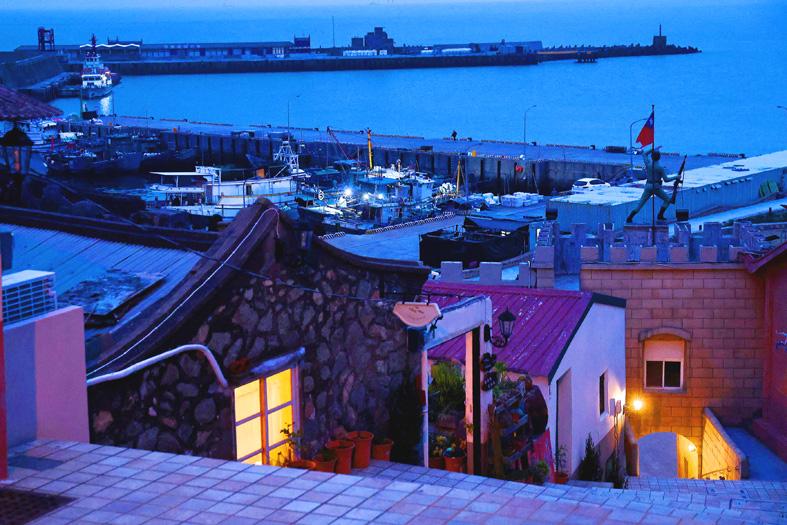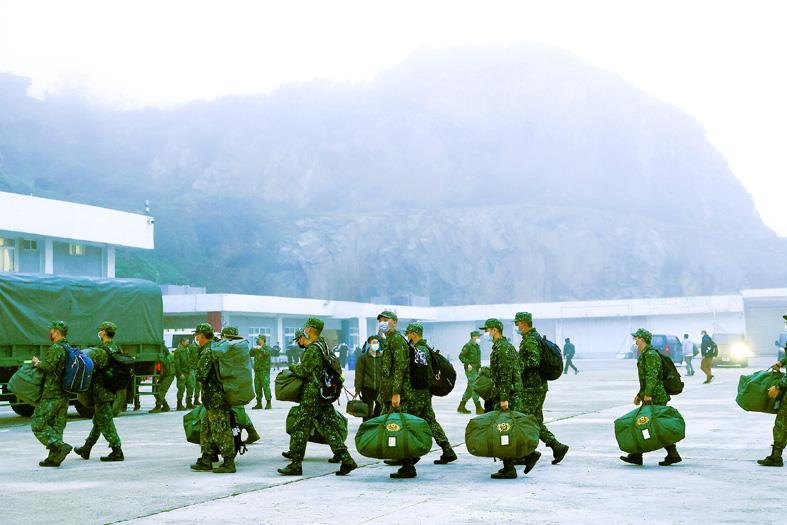Lin Jih-shou was brewing tea last month in his popular breakfast joint when he heard the buzz of a plane — a rare sound on Dongyin Island (東引), which does not have an airport.
Lin, 64, rushed outside, but only saw the shadow of what the government later described as a small, propeller-driven Chinese aircraft that most likely was testing Taiwan’s military response.
It was a stark reminder to residents of Dongyin and other islands off China’s coast of the threat from their huge neighbor.

Photo: Ann Wang, Reuters
The Matsu Islands were regularly bombarded by China at the height of the Cold War, and the history of conflict has focused minds on Russia’s invasion of Ukraine and whether the same fate might befall them.
“When we watch Russia and Ukraine fighting, our hearts hurt,” Lin said. “War is too scary. There’s no need.”
Held by Taiwan since the Chinese Nationalist Party (KMT) regime fled China in 1949 after losing the Chinese Civil War, Matsu would probably be an immediate target for Beijing in a conflict, especially Dongyin’s missile base.

Photo: Ann Wang, Reuters
Yet even with China’s increased military pressure over the past few years, the archipelago has seen trendy businesses and a nascent art scene spring up.
On the main island of Nangan (南竿), former military brothels and underground bunkers house exhibitions that opened last month as part of the inaugural Matsu Biennial art festival.
Outlying islands are being reframed as “a front line of democracy,” said Lii Wen, who established the local branch of the Democratic Progressive Party in 2020.
Dongyin native Tsai Pei-yuan, born in 1993, the year after Matsu’s strict military rule ended, is part of a generation for whom war feels distant.
Two years ago, Tsai and two former classmates cofounded Salty Island Studio, a cafe and community hub that hosts arts workshops and plays.
“More urgent is trying to preserve our culture, which is disappearing,” Tsai said before a wine-tasting event last week.
The Ukraine war is a common topic of conversation for some — including jokes about where to hide if China invades.
“When we explore strongholds, we ask, if a war really starts, which nearby stronghold would we run to?” said Chung Jing-yei, 26, who manages a restaurant.
Chung said it was only after she moved to Nangan that she understood why so many here want to maintain the “status quo.”
“My belief that we should be an independent country is resolute, but at the same time, I don’t want war to happen,” she said.
Dotting the islands’ rugged coastlines are bunkers, abandoned or transformed into tourist destinations and boutique hotels.
Older Matsu residents have vivid memories of hiding in shelters from Chinese shelling and not being allowed to own basketballs for fear that they might use them to float across to China.
“I don’t think the two sides will fight,” said Lucy Lin, a 62-year-old taxi driver and bakery owner. “As long as you don’t step over the red lines.”

US President Donald Trump said "it’s up to" Chinese President Xi Jinping (習近平) what China does on Taiwan, but that he would be "very unhappy" with a change in the "status quo," the New York Times said in an interview published yesterday. Xi "considers it to be a part of China, and that’s up to him what he’s going to be doing," Trump told the newspaper on Wednesday. "But I’ve expressed to him that I would be very unhappy if he did that, and I don’t think he’ll do that," he added. "I hope he doesn’t do that." Trump made the comments in

NOT AN OPENING: Trump’s violation of international law does not affect China’s consideration in attacking Taiwan; Beijing lacks capability, not precedent, an official said Taiwanese officials see the US’ capture of the president of Venezuela as a powerful deterrent to Beijing’s aggression and a timely reminder of the US’ ability to defeat militaries equipped with Chinese-made weapons. The strikes that toppled Venezuelan President Nicolas Maduro signaled to authoritarian leaders, including Chinese President Xi Jinping (習近平), US President Donald Trump’s willingness to use military might for international affairs core to US interests, one senior official in Taipei’s security circle said. That reassured Taiwan, the person said. Taipei has also dismissed the idea that Trump’s apparent violation of international law could embolden Beijing, said the official, who was not

A cold surge advisory was today issued for 18 cities and counties across Taiwan, with temperatures of below 10°C forecast during the day and into tonight, the Central Weather Administration (CWA) said. New Taipei City, Taipei, Taoyuan and Hsinchu, Miaoli and Yilan counties are expected to experience sustained temperatures of 10°C or lower, the CWA said. Temperatures are likely to temporarily drop below 10°C in most other areas, except Taitung, Pingtung, Penghu and Lienchiang (Matsu) counties, CWA data showed. The cold weather is being caused by a strong continental cold air mass, combined with radiative cooling, a process in which heat escapes from

Snow this morning fell on Alishan for the first time in seven years, as a strong continental cold air mass sent temperatures plunging across Taiwan, the Central Weather Administration (CWA) said. The Alishan weather station, located at an elevation of about 2,200m in central Taiwan, recorded snowfall from 8:55am to 9:15am, when the temperature dropped to about 1°C, the CWA said. With increased moisture and low temperatures in the high-altitude Alishan area, the conditions were favorable for snow, CWA forecaster Tsai Yi-chi (蔡伊其) said. The last time snow fell at the Alishan weather station was on Jan. 10, 2018, while graupel fell there